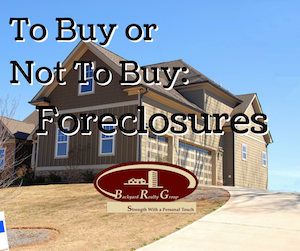
Maybe this is your first home or possibly your 10th, but regardless, making the decision to purchase a home under foreclosure is different from the standard home sale. Here are some of the obvious (and not-so-apparent) points to keep in mind…
- Can I do it by myself?
- Although you can navigate the murky waters of foreclosure homes independently, you are much better off hiring a Real Estate Agent who specializes in foreclosures. These agents have received specific training related to the entire process and will provide superior service for your distinct needs.
- It also helps to have a team behind you made up of a seasoned foreclosure real estate attorney and plenty of vendors who can quickly assess damages/repairs and provide estimates. Having a good agent can help you find these people.
- What kind of funding do I need to have?
- Get pre-approved well in advance – not just pre-qualified.
- Look into a FHA 203(k) loans as these loans can be used to finance a home not currently in habitable condition.
- Find some cash – take out a personal loan, cash in an IRA (contact your CPA for possible penalties and pay-back constraints), or refinance your current home and take out the equity.
- If it’s already a Fannie Mae-owned property, you may be eligible for a HomePath mortgage and/or a HomePath Renovation loan.
- When is the best time to purchase?
- From the homeowner in a pre-foreclosure sale. This means that the homeowner is negotiating the sales price but documentation must be provided to the mortgage lender. You can usually purchase below market price as the owner is trying to get out from under their mortgage without damaging their credit too badly.
- From a homeowner in a short sale. This process involves the lender agreeing to accept less than the current mortgage in an effort to avoid foreclosure. In this case, the lender decides the sales price.
- At an auction. These cash sales can erupt into bidding wars with several investors submitting proposals at the same time.
- From a bank after foreclosure. These properties are referred to as REO (real-estate owned) and often offer great deals as the lender doesn’t want to have to continue maintaining the property (maintenance, utilities, taxes).
- From the U.S. Department of Housing and Urban Development (HUD). You must work with a HUD-approved real estate agent to place bids but you may qualify for government-backed financing. Our agents at Backyard Realty Group are registered with HUD and know how to navigate the process.
- What repairs am I responsible for?
- Foreclosure properties are sold on an as-in basis. What you see (or don’t see) is what you get so be prepared to invest some sweat equity and cold hard cash in your new purchase. This is where the term “caveat emptor” truly comes into play.
- Many disgruntled owners in foreclosure have been known to trash a property and remove anything that isn’t nailed down. This includes light fixtures, plumbing lines, cabinet doors, and door frames (actually technically I guess those are nailed down!).
- How do I know if it is a good deal?
- Do your homework and work with your agent to get a detailed CMA (comparable market analysis).
- Get inside the home before buying if you can. This gives you an idea of what to expect when you have to renovate the property.
- Calculate the cost of restoration to the property and add it to the selling price to determine if it is worth it.
- What other obligations are there?
- Even though the primary mortgage will be settled upon closing, you will still be responsible for any liens or 2nd mortgages on the property so do your homework!
- If the home was sold for non-payment of taxes, the former owner has 12 months to bring the taxes current and purchase back the home.
- What else should I know?
- If you are purchasing for your own personal use (not as an investment home) then you have an advantage of a 5-day window before the foreclosure date to make an offer.
- It may be difficult to obtain financing on a distressed property.
- Vacant homes tend to be vandalized and looted the longer they sit empty.
- You may have to evict the former owner or even squatters who have taken up residence while it was vacant.
- Be patient – the foreclosure process can be a long drawn-out progression that can take well over 6 months to close depending on what stage it is in. It can be a bit of a rollercoaster ride, full of highs and lows, but the final destination can be worth the journey!
Check out these other Home Buying Tips we have put together!
Post by:
Casey Sellers
Casey@backyardrealty.com






